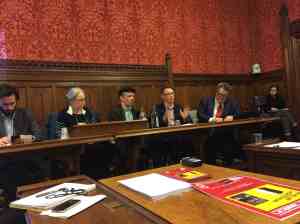Digital Citizens; From Consumers to Creators
Background; Last night (March 23rd) Cybersalon, co-ordinated by Eva Pascoe, organised one of their public events in the House of Commons discussing Digital Citizenship. This was in response to being invited to comment on 3 new government policy documents relating to the developing and evolving digital world we increasingly live in. First of all The House of Lords Digital Skills Committee report Make or Break The UK’s Digital Future (pdf). Secondly the Speakers Commisson (John Bercow) on Digital Democracy and, as it turned out, most importantly for the debate the recent report on digital surveillance Privacy and Security: A modern and transparent legal framework (pdf) by the Intelligence and Security Committee.
Debate; Opened by Richard Barbrook stating that “We should collectively regulate the Internet in the common interest” and expanding on his recent blog post on Digital Citizenship as democratic emancipation, he pointed out that we should not just be looking at political and civil rights but also socio-economic rights. The debate then mostly concentrated on surveillance. Cybersalon were originally proposing three dimensions to the debate, Digital Rights, Digital Education and a Digital Commons (or Digital Public Space), as called for in their Open Letter, but digital rights and surveillance became the focus of the discussion. Tom Watson MP talked of the need for a coherent digital policy and of his own digital pledges. Carl Miller talked of his work on digital democracy and that we needed open policy making where surveillance was concerned, perhaps having public oversight of surveillance through “intelligence jurors.” Mark Cridge of the Green Party talked of critically differentiating between our digital rights as consumers and as citizens. BirgittⒶ Jónsdóttir talked of having clear core policy, Icelands Peoples Party started with the view that in formulating policy it was for “digital rights in a borderless world,” not just Iceland. Finally Smari McCarthy of MailPile, refreshingly talked of the need for a broader debate around what is citizenship, not just what is digital citizenship, and that we should start from “trusting citizens.” (Pic of Cybersalon panel below)
Surveillance and the privatisation of Digital Space. The debate that followed the short introductory talks by the speakers was driven by concerns of overly-invasive surveillance by governments and collusion between large corporations and governments, perhaps best described as the “aggressive privatisation of the digital commons.” In the main the discussion aligned with the phrase in the Open Letter; Today, we are being barred from full participation by abusive copyright law and monopolies in search, email, social media, storage, e-commerce, hosting, and other vital components. This shared paranoia somewhat limited the debate and we didn’t move on to solutions like a Digital Public Space, Continue reading
